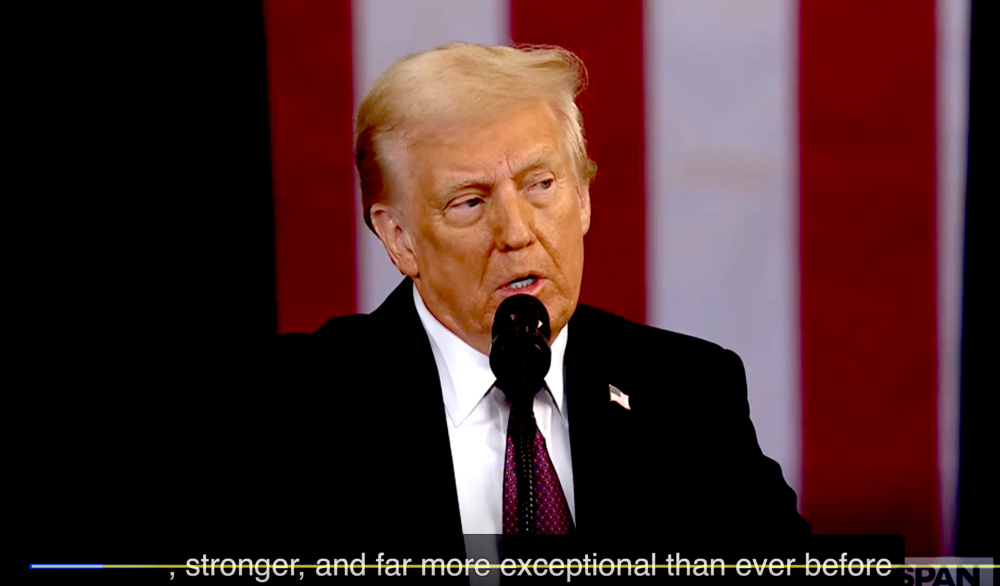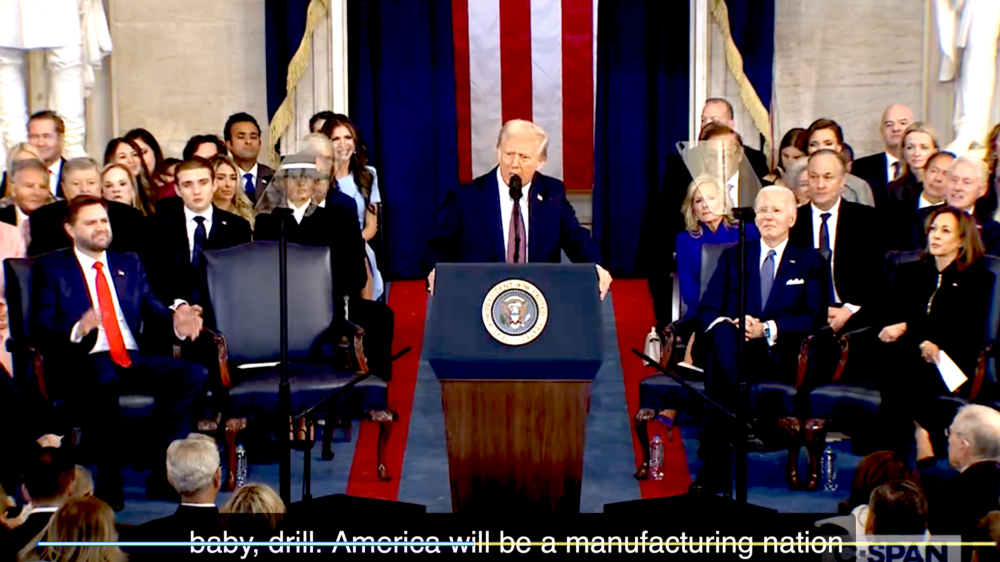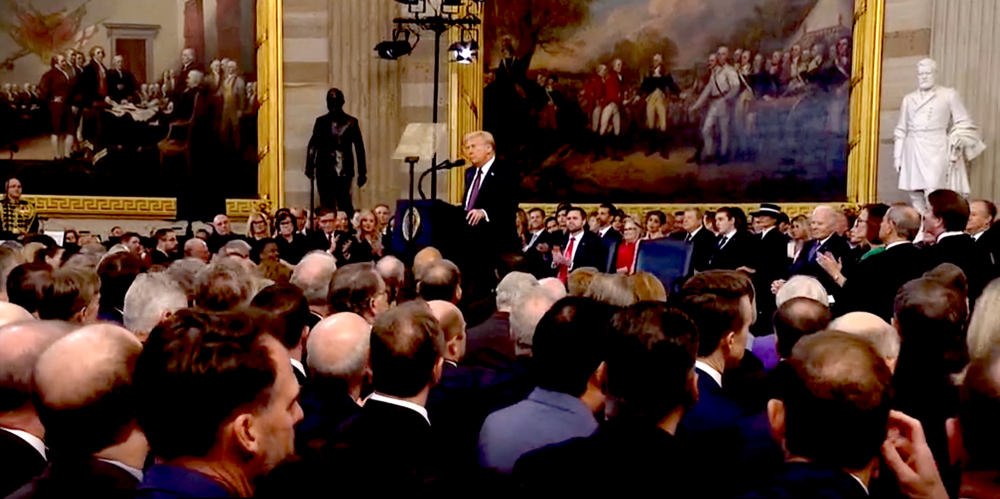As he was sworn in for a second time, Donald Trump openly declared America to be a territorial empire that would expand, even to Mars, reports Joe Lauria.
By Joe Lauria
Special to Consortium News
Donald J. Trump in his second inaugural address left little doubt that he will seek to expand America’s global empire and reverse what he sees as its recent decline, boldly declaring that a “golden age” of U.S. supremacy had begun.
Trump has been seen before ripping the mask from America’s true global intentions and on Monday made clear the U.S. has been an empire for centuries, which he aims to enforce in a super-charged, imperial presidency.
“America will reclaim its rightful place as the greatest, most powerful, most respected nation on Earth, inspiring the awe and admiration of the entire world,” he proclaimed.
“America will soon be greater, stronger and far more exceptional than ever before,” he added. Challenges the U.S. faces will be “annihilated by this great momentum that the world is now witnessing in the United States of America.”
He declared: “From this moment on, America’s decline is over.”
As though he couldn’t have made the point about U.S. primacy any clearer, he declared:
“Above all, my message to Americans today is that it is time for us to once again act with courage, vigor and the vitality of history’s greatest civilization. […]
The United States will once again consider itself a growing nation, one that increases our wealth, expands our territory, builds our cities, raises our expectations and carries our flag into new and beautiful horizons.” [Emphasis added.]
Trump used the word destiny, even “manifest” destiny to proclaim the country’s quasi-religious right to rule worlds. “Our liberties and our nation’s glorious destiny will no longer be denied,” he said.
And the U.S. would not stop at just the dominance of planet Earth. “We will pursue our manifest destiny into the stars, launching American astronauts to plant the stars and stripes on the planet Mars,” he said.
“The spirit of the frontier is written into our hearts,” Trump said. “The call of the next great adventure resounds from within our souls.”

Donald Trump promising to make the U.S. “more exceptional than ever before” during his second inaugural address on Monday. (C-Span)
He then went into a rift on “American exceptionalism” and recounted the building of an empire, from “our American ancestors [wo] turned a small group of colonies on the edge of a vast continent into a mighty republic” by pushing through “thousands of miles through a rugged land of untamed wilderness,” without mentioning the people who already lived there and were soon annihilated.
“Ambition is the lifeblood of a great nation,” he said. “And right now, our nation is more ambitious than any other.”
Trump apparently intends to pull off what few empires have done before: expand by starting no new wars, even though he said the U.S. would “build the strongest military the world has ever seen,” something that previous president have already done with little effect in winning wars of aggression.
“We will measure our success not only by the battles we win, but by the wars we end and more importantly the wars we never get into,’’ he said in his inaugural address from inside the Capitol rotunda. He wants to be seen as a “peacemaker” he said, clearly the peace of an enforced Pax Americana.
Trump again played on a note has sounded many times before, a frankly absurd notion that America is a victim on the world stage.
“From this day forward, our country will flourish and be respected again all over the world. We will be the envy of every nation, and we will not allow ourselves to be taken advantage of any longer,” he said.
While the U.S. has for decades run roughshod over the sovereignty of a host of nations, he declared, “Our sovereignty will be reclaimed.”
Trump blasted the stewardship of the empire by the Biden administration. “We now have a government that cannot manage even a simple crisis at home, while at the same time stumbling into a continuing catalog of catastrophic events abroad,” he said.
Trump attacked any effort in U.S. schools to open students’ eyes to America’s actual historic behavior in the world.
“We have an education system that teaches our children to be ashamed of themselves in many cases, to hate our country despite the love that we try so desperately to provide to them,” he said. “All of this will change starting today, and it will change very quickly.”
Trump wants American school children to only be taught what he sees as the greatness of America’s historical, imperial might. In doing so, he praised President William McKinley, one of the most openly imperial presidents in history.
In his quest to reverse what he see as “wokeness,” Trump wants to deny the long history of indigenous peoples on the North American continent, victims of empire-building white settlers for whom Trump acts as spokesman.
He said: “A short time from now, we are going to be changing the name of the Gulf of Mexico to the Gulf of America. And we will restore the name of a great president, William McKinley, to Mount McKinley, where it should be and where it belongs.”
He said McKinley “gave Teddy Roosevelt the money for many of the great things he did, including the Panama Canal,” as if making money is what presidents do.
Trump declared that the canal has “foolishly been given to the country of Panama” after the U.S. built it. “We have been treated very badly from this foolish gift that should have never been made,” he said, incorrectly stating that China “operates” the canal, when it only controls ports at either end.
“China is operating the Panama Canal,” he said, “and we didn’t give it to China, we gave it to Panama. And we’re taking it back.”
Trump unquestionably compared himself to the super empire-builder who he says paid for the canal. “President McKinley made our country very rich, through tariffs and through talent. He was a natural businessman,” Trump said.
Trump sees what appears to be a megamonical role for himself in furthering U.S. imperial might. In speaking of his survival from an assassin’s bullet, he said: “My life was saved for a reason. I was saved by God to make America great again.”
Joe Lauria is editor-in-chief of Consortium News and a former 25-year U.N. correspondent for The Wall Street Journal, Boston Globe, and other newspapers, including The Montreal Gazette, the London Daily Mail and The Star of Johannesburg. He was an investigative reporter for the Sunday Times of London, a financial reporter for Bloomberg News and began his professional work as a 19-year old stringer for The New York Times. He is the author of two books, A Political Odyssey, with Sen. Mike Gravel, foreword by Daniel Ellsberg; and How I Lost By Hillary Clinton, foreword by Julian Assange.
Please Support CN’s
Winter Fund Drive!![]()
Make a tax-deductible donation securely by credit card or check by clicking the red button:
More/Source: https://consortiumnews.com/2025/01/20/the-imperial-presidency-marches-on/





